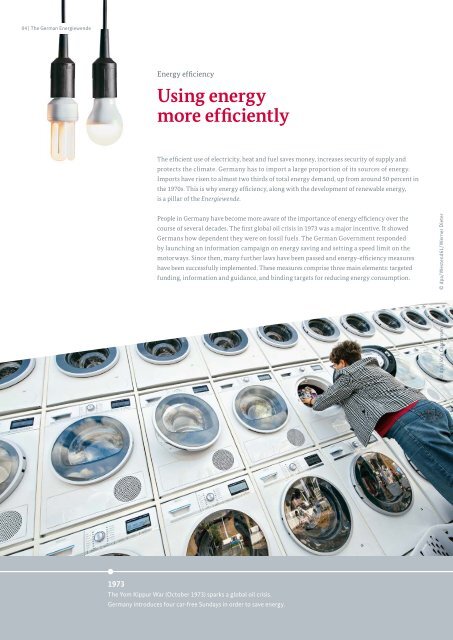The German Energiewende
Create successful ePaper yourself
Turn your PDF publications into a flip-book with our unique Google optimized e-Paper software.
04 | <strong>The</strong> <strong>German</strong> <strong>Energiewende</strong><br />
Energy efficiency<br />
Using energy<br />
more efficiently<br />
<strong>The</strong> efficient use of electricity, heat and fuel saves money, increases security of supply and<br />
protects the climate. <strong>German</strong>y has to import a large proportion of its sources of energy.<br />
Imports have risen to almost two thirds of total energy demand, up from around 50 percent in<br />
the 1970s. This is why energy efficiency, along with the development of renewable energy,<br />
is a pillar of the <strong>Energiewende</strong>.<br />
People in <strong>German</strong>y have become more aware of the importance of energy efficiency over the<br />
course of several decades. <strong>The</strong> first global oil crisis in 1973 was a major incentive. It showed<br />
<strong>German</strong>s how dependent they were on fossil fuels. <strong>The</strong> <strong>German</strong> Government responded<br />
by launching an information campaign on energy saving and setting a speed limit on the<br />
motorways. Since then, many further laws have been passed and energy-efficiency measures<br />
have been successfully implemented. <strong>The</strong>se measures comprise three main elements: targeted<br />
funding, information and guidance, and binding targets for reducing energy consumption.<br />
© dpa/Jörg Carstensen © dpa/Westend61/Werner Dieter<br />
1973<br />
<strong>The</strong> Yom Kippur War (October 1973) sparks a global oil crisis.<br />
<strong>German</strong>y introduces four car-free Sundays in order to save energy.

















